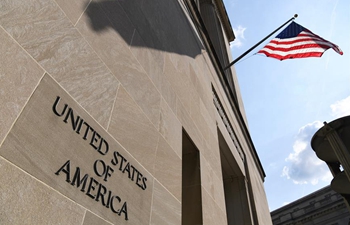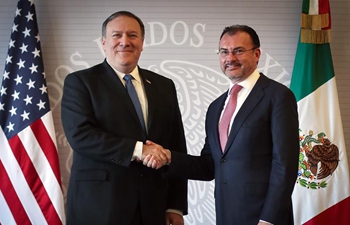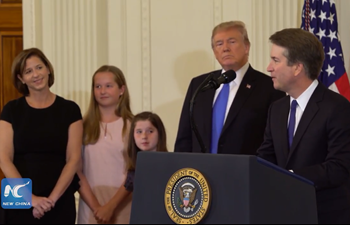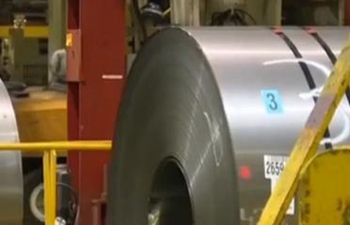ATLANTA, July 13 (Xinhua) -- Despite concerns over the U.S.-initiated trade dispute with China, the state of Georgia is showing strong interest in building cooperative ties with Chinese partners in order to offset the negative impact caused by Washington's protectionist trade policy.
Georgia, a southern U.S. state known for its business-friendly environment and trade-driven economy, just hosted an investment and trade forum with northwest China's Shaanxi Province for local entrepreneurs and business representatives who were eager to find more potential opportunities to forge partnerships with the Chinese side.
Andrew Neumann, vice president of Kajima Building and Design Group, Inc., told Xinhua that his business would likely be affected by the trade dispute as it constructs projects for U.S. businesses in China and Chinese businesses in the United States.
"There's a possibility that there are some projects that will not happen on either side because of the trade war or tariffs that are levied on certain products," said Neumann, who's trying to expand the company's cooperation with China to ease the concern.
"It's always good to make new relationships in business," he said. "We still want to do business in China and we want people from China to do business in the United States."
Although Aventure Aviation, which sells and exports spare aviation parts, hasn't been directly affected by the trade dispute, the Georgia-based company's president, Zaheer Faruqi, told Xinhua that he hopes the trade dispute would be over soon.
The United States and China, which enjoy a long business relationship, "should sit down and recognize the trade issues and resolve them without getting the trade war into perspective," said Faruqi, who's also worried that an escalation of the dispute would cost his company's business relationship with China.
Faruqi said that Aventure Aviation, whose Chinese partners includes Boeing Shanghai Aviation Service, is set to attend an airshow in Zhuhai, southern China's Guangdong Province, slated for November this year.
"We are very eager to do business with China," he said. "We are hoping that Chinese companies will continue to do business with us."
At the investment and trade promotion event, Shaanxi's provincial government officials and entrepreneurs introduced to Georgia the province's advantageous environment for foreign investment and business.
Home to the famed Terra Cotta Warriors, Shaanxi's capital city of Xi'an is known for its high-tech industry, strong universities and reserve of talent, historic role as a major stop along the ancient Silk Road and an ambitious plan to become a regional financial hub.
Shaanxi and Georgia have agreed that they have a great complementarity in economic and social development, with rich potential in cooperation and exchanges in the areas of aviation manufacturing, agriculture, logistics, environmental technologies and tourism.
Georgia and Shaanxi have "very similar feelings about business," Neumann said. "We are all pro-business and we all want the best for our communities and so I see many companies from Georgia looking to Shaanxi Province to do trade and possibly build plants there as well."
"When we have interactions at the provincial level and local level of cities, that's when things can really get done," Mary Waters, deputy commissioner overseeing international trade for the Georgia Department of Economic Development (GDED), told Xinhua.
The cooperative relationship that Georgia, the country's 7th largest importing state and 12th largest exporting state, enjoys with China has grown tremendously, Waters said.
According to the GDED, Georgia's exports to China have grown by 41 percent over the past decade, exceeding 2.8 billion U.S. dollars. China has become a top trading partner with the U.S. state.
Besides, there are more than 100 Chinese facilities, including some run by Chinese auto and aviation tire manufacturer Sentury Tire and electronics company Hisense, now operating in Georgia and employing thousands of locals.
"That speaks volumes to the importance to be on the ground and to be constantly building new relationships to drive the relationship for the future," Waters said.
Local reports said a delegation of officials and business executives from Georgia will visit China next week, on board a nonstop flight under a partnership between Atlanta-headquartered Delta Air Lines and China Eastern Airlines.
The Georgia delegation's upcoming trip aims to build closer economic, tourism and educational ties between Georgia and Chinese cities.
"Both global connectivity and maintaining a strong relationship with China are extremely vital to Georgia's economic landscape," Georgia Governor Nathan Deal said.
The Trump administration has imposed high tariffs on imported steel and aluminum products as well as Chinese goods, drawing strong opposition from its domestic business community and retaliatory measures from U.S. trading partners.
"We don't want a trade war," Thomas Smith, an economist at Emory University's Goizueta School, recently told local newspaper The Atlanta Journal-Constitution.
Dramatic cuts in trade "would be impactful" for Georgia and threaten tens of thousands of local jobs backed by an open economy, Smith said.













